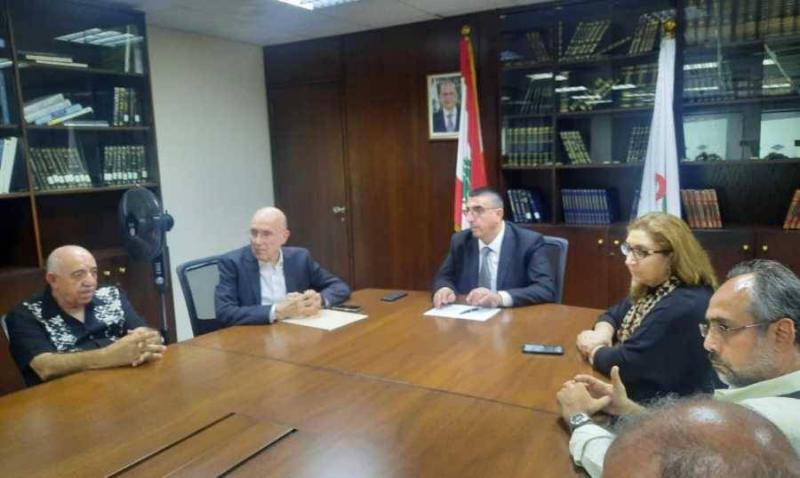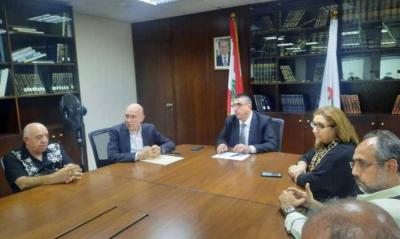Lebanon's caretaker Minister of Social Affairs, Hector Hajar, met today, Wednesday, with a delegation from the Gathering of Voluntary Civil Society Bodies in Lebanon and the Follow-up Committee for Lebanese and Palestinian Civil Society Organizations. The General Coordinator of the Gathering, Dr. Kamal Mahna, presented the proposals of the Gathering of Civil Society Bodies, expressing the solidarity of the Gathering with our people in Gaza and Palestine amid the ongoing genocide targeted at the sector. Mahna reviewed, on behalf of the Gathering, the points of observations on the plan submitted by the government in cooperation with the relevant ministries. These points included a set of proposals within the framework of ongoing cooperation between the two parties to integrate roles and enhance comprehensive humanitarian response efforts, especially given that Lebanon is entering a state of maximum emergency, with the potential escalation of border clashes with Lebanon evolving into a comprehensive war reminiscent of the July 2006 aggression.
The two parties discussed the details of the emergency plan put forth by the caretaker government in collaboration with United Nations organizations, relevant authorities, the National Committee for Disaster and Crisis Coordination, and the Disaster Risk Management Unit at the Prime Minister’s office, in response to the likelihood of war expansion. The Gathering provided some observations and suggestions on the plan in order to strengthen the integrated response among all involved parties. The observations and proposals addressed various aspects of the plan, which particularly focused on securing shelters for displaced persons, ensuring the necessary relief supplies, and safeguarding food security. Several assumptions were adopted, based on a benchmark comparison to what occurred during the Israeli aggression in July 2006, which involved the forced displacement of one million Lebanese over a period of 45 days and the preparation of collective shelters to accommodate 20% of the displaced, or at least 200,000 people.
Additionally, there was unprecedented pressure on the healthcare sector and efforts to secure humanitarian supplies for displaced persons within shelters, which the government emphasized would be the responsibility of local and international humanitarian organizations. The Gathering confirmed that its members, whether individually through their respective organizations or collectively, would coordinate their responses and would strive to align their efforts with the plan under the supervision of the relevant ministries.
Regarding the plan’s approach to dividing the needs of three demographic groups of Lebanese citizens, for which the ministries and relevant authorities are responsible, and dividing the remaining population into three categories: displaced persons, Palestinian refugees, and migrant workers for which local and international organizations are tasked with meeting their needs, the Gathering considered, “this classification is effective as long as efforts are coordinated integratively and necessary resources are secured to activate the response. However, relying on humanitarian organizations to handle the three non-Lebanese groups may pose a risk due to the inability of these associations to secure the necessary funding.” Therefore, the Gathering is in contact with international partners urging them to support Lebanon and respond to its needs in line with the current situation, especially since Lebanon is experiencing a multi-layered crisis across political, economic, social fields, and infrastructure, apart from the emergence of a new factor: war, which will exacerbate the conditions across all sectors, potentially escalating to the entire region.
Thus, supporting Lebanon and preventing a deterioration of the situation there is a guarantee for regional and global peace. The Gathering also discussed the challenge of securing fuel and transportation, which may hinder the successful implementation of the field emergency plan, in addition to the need to train as many individuals as possible who can handle the field response, which the organizations under the Gathering are currently attempting to carry out, affirming their efforts to support the government plan by addressing any gaps or difficulties that may arise during the implementation.
The Gathering emphasized the need to prepare for the worst, stating, “despite the brutality of the experience in 2006 and the experience of the Gathering members in responding at that time, what Lebanon may witness could significantly exceed the July aggression scenario.” Therefore, the Gathering stressed the necessity to continue coordinating efforts and work collectively under state supervision, alongside strengthening diplomatic and humanitarian efforts to mobilize a prior solidarity campaign with Lebanon in case of war expansion and linking it to a global solidarity campaign with Gaza, considering that this reality should be leveraged to invigorate the political life in Lebanon and push for the urgent election of a president of the republic and the formation of a government capable of responding to any emergency situation in the country.
The Gathering also asserted that “involving all actors in the country in the emergency plan in a way that integrates and reinforces roles, thereby avoiding duplication of response, is essential for ensuring an effective response. Now is the right time to ensure the plan is available to everyone so that all parties can align their response accordingly.” In conclusion, members of the Gathering stated that “the organizations under its umbrella, which have played a pivotal role in preserving the cohesion of Lebanese society and strengthening its resilience during the civil war and repeated Israeli wars on Lebanon, will not hesitate to make every possible effort to stand with the people and uphold their rights and dignity, no matter the cost. They expressed gratitude for the cooperation of the Ministry of Social Affairs and its leading role in coordinating efforts among humanitarian actors and other state institutions and stakeholders, to avoid leaving Lebanon to a dark fate in the presence of an occupation that disregards international humanitarian laws and conventions.”




